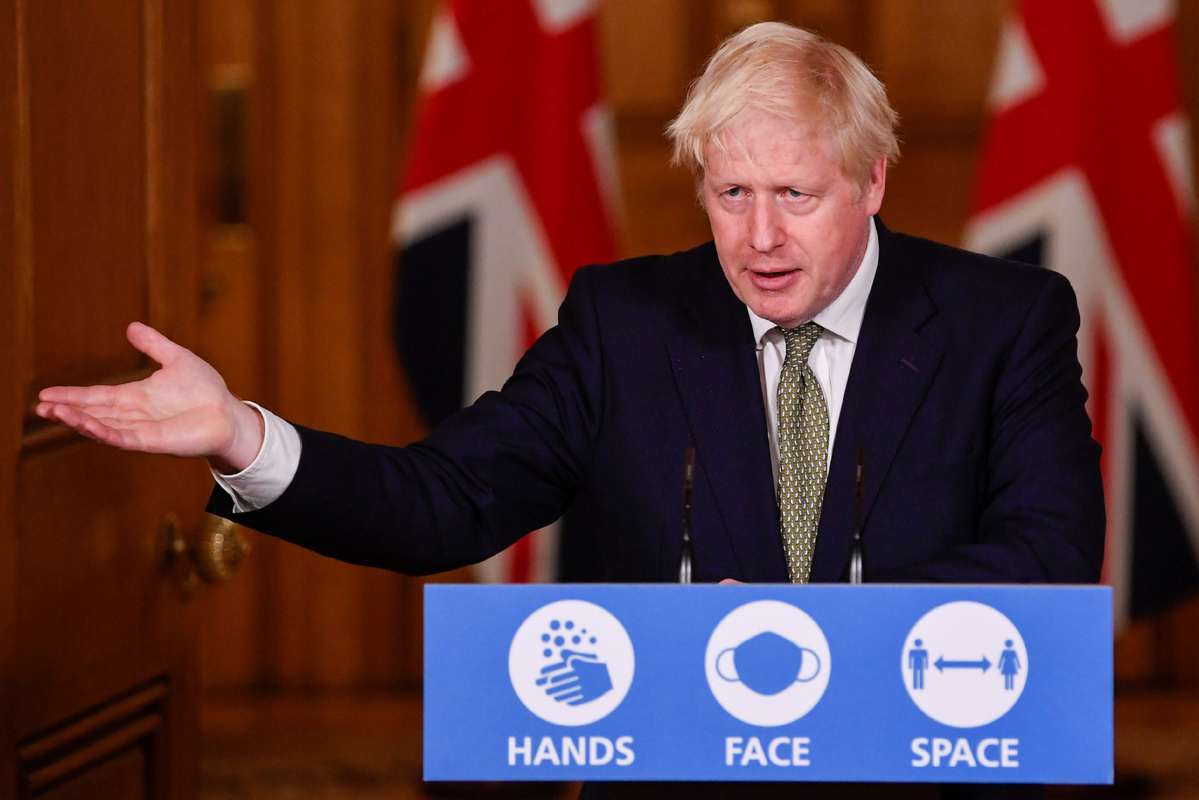
Britain's Prime Minister Boris Johnson gestures as he speaks during a virtual news conference on the ongoing situation with the coronavirus disease (COVID-19), at Downing Street, London, Britain, Oct 12, 2020. (Photo: Agencies)
The United Kingdom's main opposition party accused the government on Monday of "treating local leaders with contempt" as Prime Minister Boris Johnson prepared to unveil a three-tier novel coronavirus warning system that will be used to trigger regional lockdowns.
Keir Starmer, leader of the Labour Party, said Johnson's ruling Conservative Party had made a "major mistake" by not building a consensus with stakeholders before introducing the three-tier system that is expected to herald strict local lockdowns in hard-hit areas, especially in the North of England where virus infections and COVID-19 hospitalizations have been rising exponentially.
Starmer said on the LBC radio station that too many decisions made during the pandemic had been "done to people in the North, not with them".
Regional politicians and business groups said they will challenge the system that will categorize regions as being at either "medium", "high", or "very high" risk, in the courts, if necessary.
Johnson, who started his day by chairing a meeting of the government's emergency committee before heading to Parliament in the afternoon to brief lawmakers, was set to host a news conference on the new system on Monday evening.
Earlier, Jonathan Van Tam, England's deputy chief medical officer, led a scientific briefing to explain how infections had risen to 12,872 a day by Sunday.
He said: "The epidemic, this time, has clearly picked up pace in the North of England earlier than it did in the first wave and that almost certainly relates to the fact that disease levels in the North never dropped ... as far as they dropped …in the South."
Senior medics said specialist COVID-19 Nightingale hospitals in the northern cities of Manchester, Sunderland, and Harrogate will be put on stand-by as a result.
But another northern city, Liverpool, led criticism of local lockdowns that are expected to hit parts of the North far harder than the South.
The city, which during the week ending Oct 6 had 600 cases per 100,000 people in comparison to the average for England of 74, said regions placed on level 3 of the new system and therefore subject to the most severe local lockdowns should be offered additional financial support, and assurances they will be allowed to reemerge from their lockdowns as soon as possible.
Culture Secretary Oliver Dowden countered on BBC Radio 4's Today program by saying the government was "not panicking" when it devised the three-tier system, nor treating areas unfairly. He said it was simply taking "reasonable and proportionate measures".
Dowden told Sky News he hopes the three-tier system will help the government get the virus under control by early next year.
"If those measures are successful, we hope to be able to take areas out of those high levels of restrictions," he said. "The purpose of doing this is to ensure we get the virus under control."
Calum Semple, a professor of outbreak medicine at the University of Liverpool and a member of the government's scientific advisory group for emergencies, said on the BBC's Breakfast television program that specific lockdown measures, such as the closure of bars and limitations on household gatherings in high-risk areas, will be based on facts.
"Most of the outbreaks are happening within and between households and then, after that, it's in the retail and hospitality sector," Semple said.
"So, the major issue here is to focus on the cities and areas with the largest outbreaks and, sadly, my home city of Liverpool is being hammered at the moment. These restrictions are necessary."
But Michael Kill, head of the Night Time Industries Association, a trade body that represents pubs, restaurants, and clubs, said the latest system, which will make the closure of entertainment venues even easier, is not based on facts because he has seen no evidence of hospitality venues contributing to the spread of COVID-19.
"These new measures will have a catastrophic impact on late-night businesses, and are exacerbated further by an insufficient financial support package presented by the chancellor in an attempt to sustain businesses through this period," the BBC quoted him as saying.
In a particularly busy day for the government, Education Secretary Gavin Williamson said GCSE, AS, and A-level exams will go ahead in England next summer, but three weeks later than usual.
"Students have experienced considerable disruption and it's right we give them, and their teachers, the certainty that exams will go ahead and more time to prepare," the Guardian quoted him as saying.
Elsewhere in Europe, Italy moved closer to a new round of national restrictions on Monday as the daily toll of new infections hit 5,000.
Greece warned infections there are also rising fast. In addition, a survey in France of 60,000 nurses found more than 50 percent were close to burn-out because of canceled vacations and additional work.


